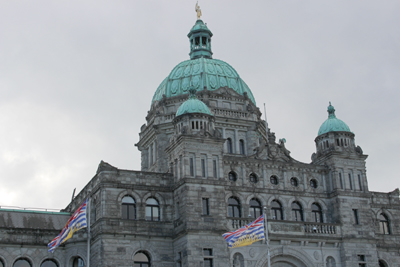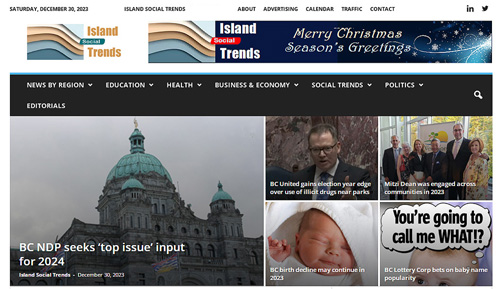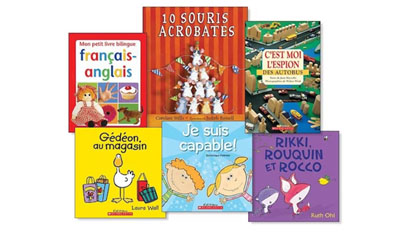Friday January 5, 2024 | VICTORIA, BC
by Mary P Brooke | Island Social Trends
The Province of British Columbia has developed a French-language policy that it says will guide government ministries in enhancing services to French-speaking residents.
“The French-language policy will gradually improve government’s ability to serve francophones throughout the province, based on needs and available resources,” it was stated in a news release today — one of the first BC government news releases issued in both of Canada’s official languages.
The French and English languages are enshrined in Canada’s Constitution.
The policy will also ensure government increases engagement activities with French-speaking residents so their needs are better integrated in program, policy and services development.
French-speaking residents in BC:
Of BC’s current population, 1.5% speak French regularly at home, according to the BC Intergovernmental Relations Secretariat Francophone Affairs. That’s about 76,000 people in the province.
Approximately one in 25 immigrants can have a conversation in French.
More than 328,000 people in British Columbia (6.6% of B.C.’s population) can conduct a conversation in French, making B.C. the jurisdiction with the third-largest population of French speakers in Canada after Quebec and Ontario.
BC’s total population reached an estimated 5,519,013 at July 1, 2023, a notable increase of 52,367 compared to the previous quarter, according to BC’s Quarterly Population Highlights (September 2023). Since July 1, 2022 the population of BC has experienced an annual growth rate of 3.0%, marking the highest annual increase since 1974.
Last province to jump in:
“Prior to today, British Columbia was the sole jurisdiction in Canada without an overarching policy on French-language services, despite providing information and services in French to its numerous residents,” said Adrian Dix, Minister of Health and Minister responsible for Francophone Affairs.
“The new policy represents a positive step to increase the Province’s capacity to engage with and provide services to its French-speaking residents,” said Dix in today’s news release. He says that “greater co-ordination and access to information and services in French will bring the added benefit of fostering the vitality of the B.C. and Canadian Francophonie”.
“French is integral for British Columbia’s linguistic identity and diversity,” says Dix.
“Providing government information and services in French is a crucial component of the Province’s approach to enhancing accessibility for all British Columbians,” Dix said. “Our government aims to remove barriers and be inclusive so francophones can play an active role in our province’s social, cultural and economic development.”
During media sessions, Minister Dix is often called upon to deliver or repeat answers in French — usually at the request of CBC national news reporters.
Dix has had several meetings with federal health ministers over the years. In 2023 BC received more health-transfer funds from the federal government by which health care system data reporting is key.
Mother tongue & schools:
Nearly two-thirds of people in British Columbia who had French as their only first official language spoken in 2021 were born in Canada, but outside British Columbia, reports the BC government today.
Statistics Canada says 96% of Canadians report one mother-tongue (2021 census). The number and proportion of people who reported having more than one mother tongue has been on the rise since 2006.
In the past 10 years, enrolment in French-immersion education in BC has reportedly increased by seven percent and enrolment in Conseil scolaire francophone (an organization that lists French-language schools to help support families) has increased by 23.6%.
There are currently 36 French-language schools in BC including seven on Vancouver Island (two of which are in Victoria, and one each in Campbell River, Comox, Duncan, Nanaimo and Port Alberni).
The Canadian Parents for French (CPF) organization bills themselves as supporting the journey to bilingualism.
Canadians report knowing a language when they feel they can conduct a conversation in that language. Canadians who can have a conversation in two languages are bilingual.
Next steps:
An implementation plan will be developed in collaboration with francophone partners. The policy will come into effect on April 1, 2024, and be subject to regular evaluations.
All BC government ministries are to consider the needs and priorities of Francophones and to proceed incrementally as to providing services, as resources allow, as stated in the French-language policy.
===== RELATED:
- Robust registration expected for Sept 2024 Kindergarten (January 4, 2024)
- Retail book fundraiser for SD62 French-language school library (November 27, 2023)
- $1.2 billion in federal health funding to BC over 3 years (October 10, 2023)
- SD62 Sept 2023 waitlists for Nature K and French Immersion (January 20, 2023)
NEWS SECTIONS: EDUCATION | POLITICS
ISLAND SOCIAL TRENDS: ADVERTISE IN THESE PAGES | SUBSCRIBE TO THE BIWEEKLY PDF










